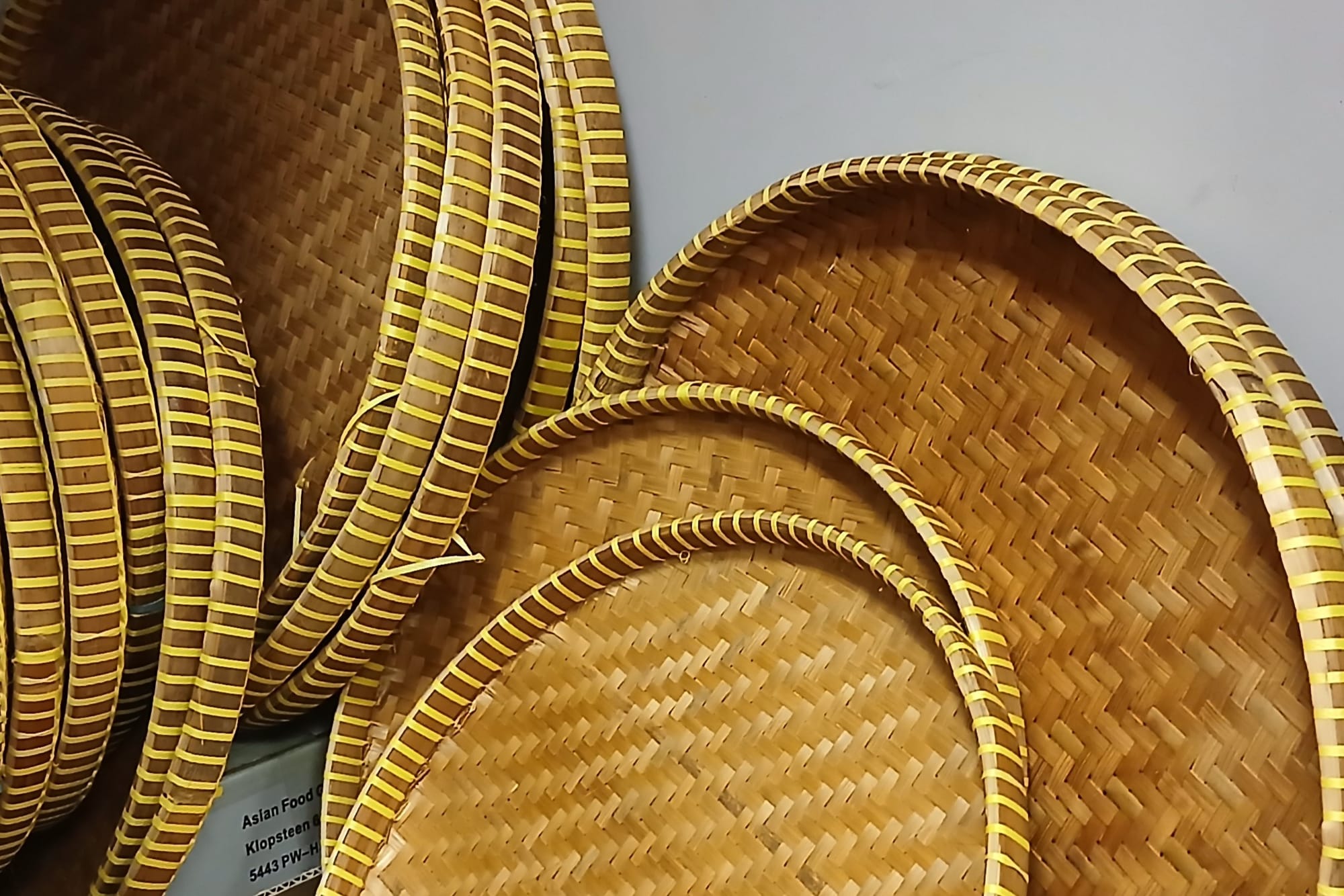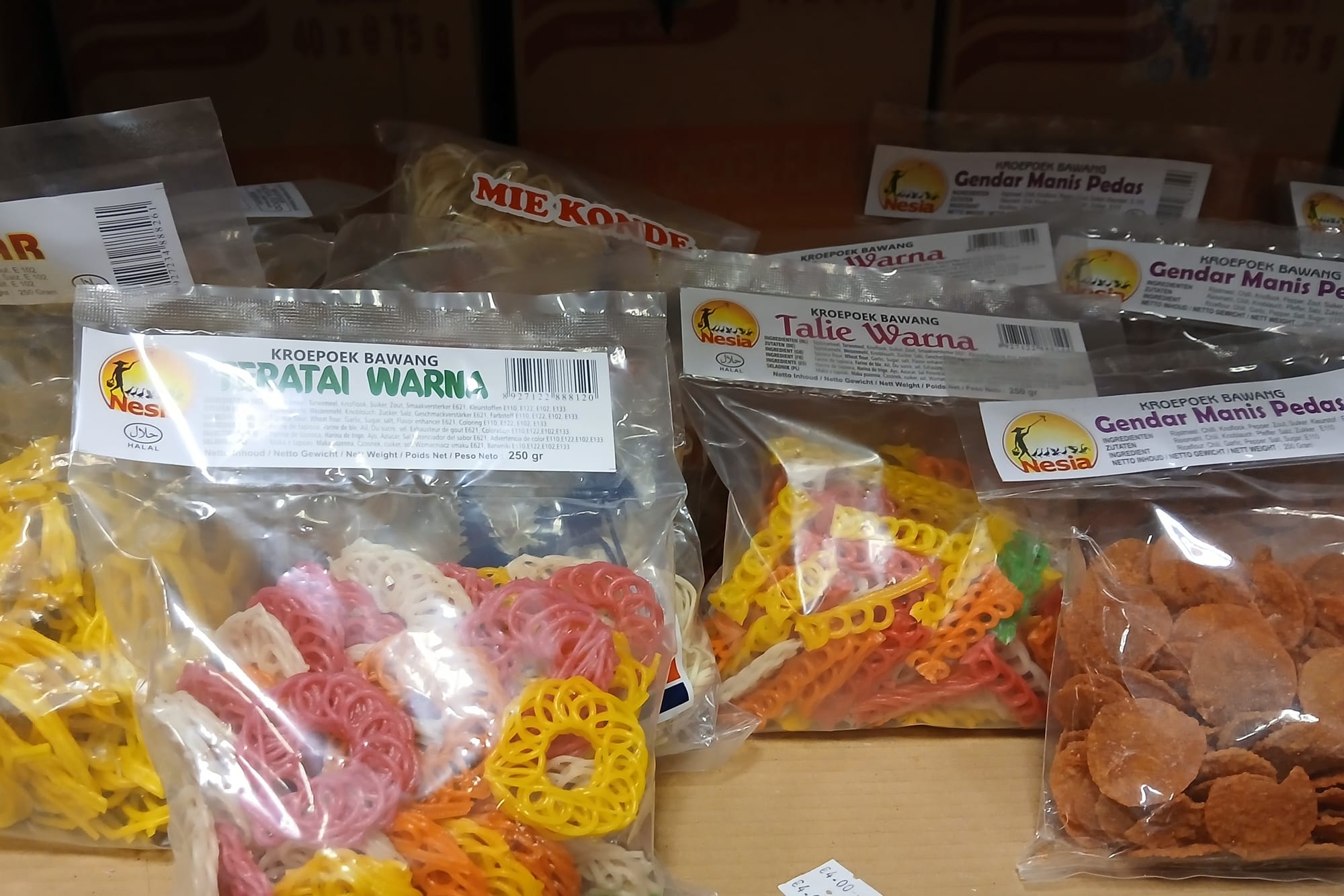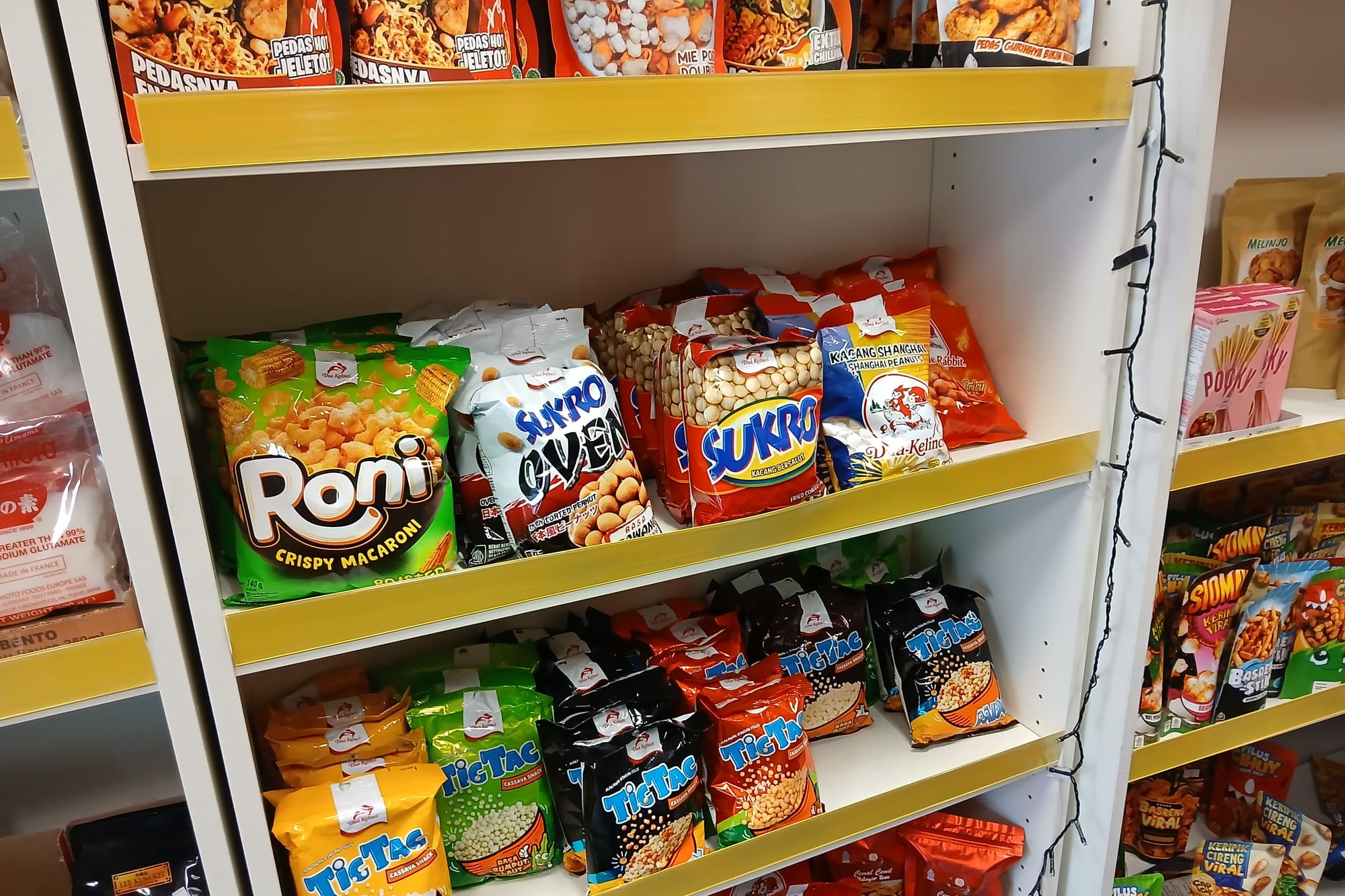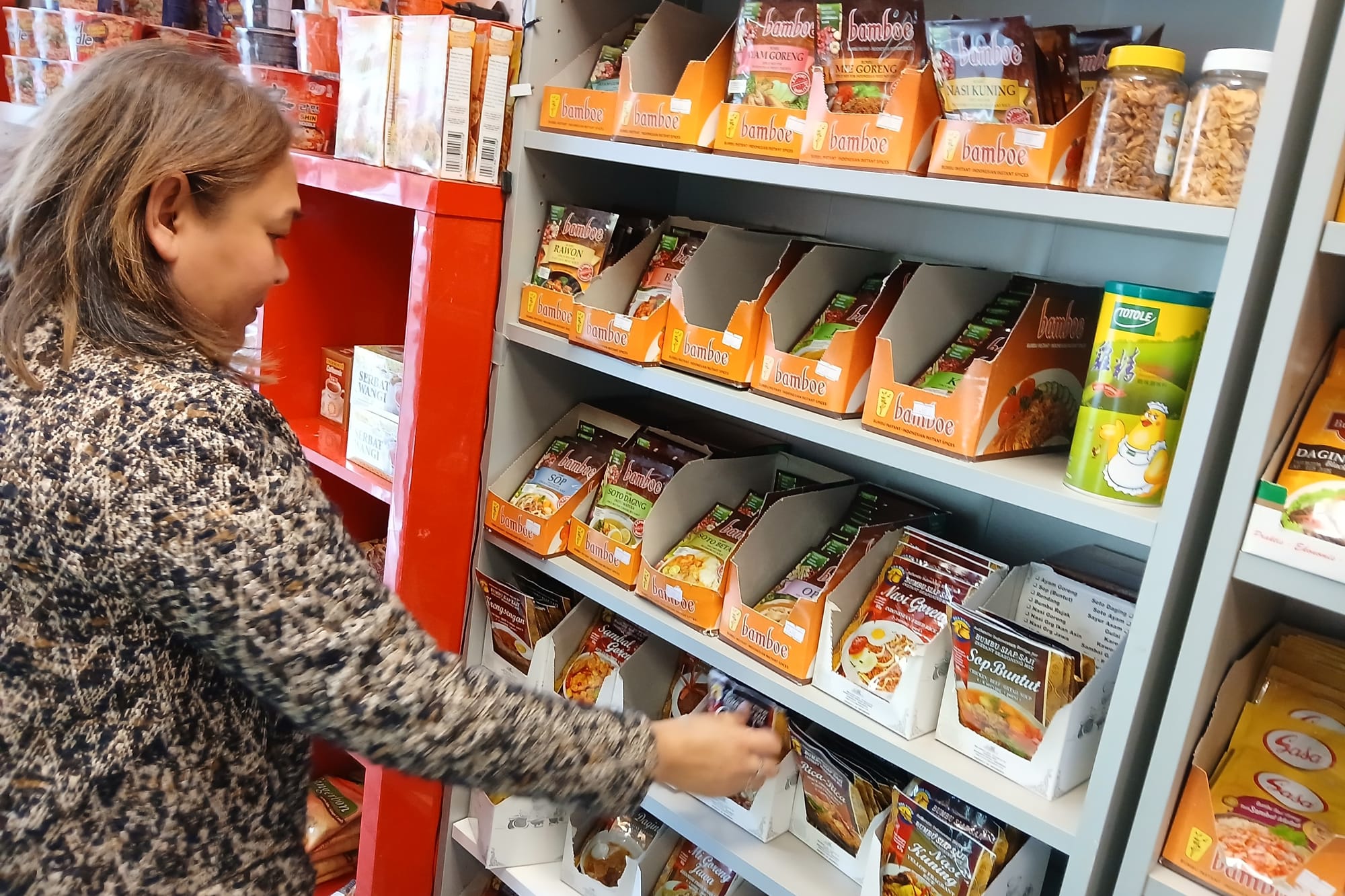What’s the best way to tell area residents about plans for a new asylum shelter nearby?
The government should tell communities directly about plans for new asylum shelters, some activists and politicians say.
There’s a small table with two chairs set up in the parking spot in front of DeSa. But no restaurant – yet.

On Sunday about 1pm, four customers, hooded against the rain, and laden down with bags, bundled out the glass front door of DeSa Asian Products in Crumlin.
It’s in a strip of shops, between a barbers and a Daybreak, on Old County Road, by the corner of Clonard Road.
Derek and Sarah Connolly were seeing them out, waving, and saying their goodbyes. Then they duck back inside, out of the rain.
The narrow shop is lined with shelves and stuffed with products from all over Indonesia, where Sarah is from.
Derek’s from Rathfarnham, but has called Crumlin home since the 1980s, and the couple live right nearby, which is handy, they say.
They keep the shop open 10am to 8pm seven days a week, and also sell online, sending parcels by courier to people all over Ireland craving Indonesian food, they say.
“We still standing here, we still here after two years. Pretty good, right?” says Sarah.
She has dreams of expanding the shop, and of opening an Indonesian restaurant, she says.
Derek has another job, at an auto parts shop in Inchicore, but he says he works at DeSa before and after it each day, and also at the weekends.
“We’re in it together,” he says.
The couple met online, Derek says.
Sarah came to visit Ireland in 2017, then again in late 2019, he says.
“Sarah arrived here for a three-month visit, but then Covid arrived [in early 2020], so there wasn’t any way to travel,” he says.
A businesswoman from Jakarta, she’d run a clothes shop back home, and couldn’t sit still wondering and waiting when she might get back to it, she says.
“I was always doing business,” she says. “I can’t just sitting waiting my time, my brain is always working, so I started doing online. I find supplier and buy.”
The couple saw an opening where they could import products and sell them to the Indonesian community. “Which is quite large, actually,” says Derek.
There were 286 people born in Indonesia living in Ireland at the 2011 census, and that had risen to 560 by the 2022 census.


The Connollys set up DeSa officially in May 2021, company records show, and started selling online.
“In Indonesia ‘desa’ means ‘village’, but they never notice DeSa is made from his name and my name,” Sarah says.
By the time things got back to normal, Sarah had residency in Ireland and had a business and had a life in Crumlin.
You cannot have a plan, she says. “We don’t know. We can make a plan, but control is upstairs”, she says, pointing up through the white foam panels of the shop’s dropped ceiling, towards the heavens.
Why did they decide to add a real-world shop to their online one?
“Because the house already full,” Sarah says, and laughs.
She’s at the back of the shop, standing among the shelves stocked with bags and boxes, packets and parcels.
“Selling from the house wasn’t really practical,” Derek says, not laughing.
“Also, we need local customers. We need to introduce the product to local people around, let’s say, around Crumlin or Dublin, or anywhere,” Sarah says.
Other shops in Dublin sell various Asian foods, but DeSa specialises in Indonesian ones, many of which can’t be found in big stores like Asia Market, Sarah says.
What’s different? She points to a shelf stuffed with bags of snacks imported from Indonesia. “Snacks!” she says.

Among them is Basreng Geprek, a kind of crisp-type snack. Inside the foil-lined orange bag are shards that could be the crispy bits from a bag of chips.
Really crispy bits. Like rusk maybe. The bag says they are made from wheat and tapioca flours– and bathed in a mix of fiery chilli and fish sauce flavouring.
On the shelf nearby, is a box that says “Pocky”. Inside, there’s a type of stick-shaped biscuit, dipped in sweet strawberry-flavoured coating.
“Sarah’s a great cook,” says Derek.
A couple of his favourites from her repertoire of Indonesian dishes are nasi goreng, a kind of fried rice, and mi goreng, a fried noodle dish.
The couple walk towards the front of the shop and stop at a shelf stuffed with packets containing spice mixtures to make these dishes.
Sarah starts taking packets down. “For noodles, for mutton stew, for fried rice, for Japanese curry,” she says.
There are packets that say “nasi goreng” (fried rice), “sop buntut” (oxtail soup), “nasi koning” (rice with coconut and turmeric), and “rendang” (sauce for meat stewed in coconut milk and spices).

Indonesia is a vast, sprawling country of 280 million people, with a wide variety of food traditions. Sarah’s from the capital, Jakarta, on the island of Java.
But there are more than 17,000 islands that make up the country, scattered across the seas south of Malaysia and north of Australia.
Indonesia stretches for 3,750km east of Jakarta, to the border with Papua New Guinea. And north-west from Jakarta for about 1,800km to the tip of the island of Sumatra.
The spice mixes reflect some of the diversity of styles of cooking.
“This one’s from Sumatra, this around Sulawesi,” Sarah says, flipping through them. “This Papua, this from Bali, Bali, Bali, this one is Surabaya, east Java, this is the west of Java.”
What about this box, which says “Kentucky Hot”, and has a picture of fried chicken on the front?
Sarah laughs. Derek doesn’t, but his eyes light up. “It’s very, very good,” he says.
There’s a small table with two chairs set up in the parking spot in front of the shop. But they don’t have a restaurant. Yet.
Sarah would like to, she says. “I wish.” She doesn’t think there’s any Indonesian restaurants at the moment in Ireland, she says.
There are places that sell Malaysian food, like Kopitiam, on Capel Street. There’s a lot of overlap between Malaysian food and Indonesian food, Sarah says.
“The food almost same, only difference is more choice for Indonesian,” she says.
But most Asian food sold in Ireland is toned down to suit local tastes, Sarah says. “Maybe for European taste is good, but for me, I taste the difference,” she says.
Yeah, like at the local Chinese takeways, the food they serve is “adjusted to the Irish taste”, Derek says chuckling.
“The interesting thing is, we will go to the take-away around the corner, and they actually do a special meal for Sarah,” he says.
“Because I say I want the original taste,” Sarah says.
It’s that kind of Indonesian restaurant Sarah wants to open. But she’d need more help to do it, she says.
It would mean cooking and service, she says, “and then the shop is not easy to handle”.
And to hire more help, she’d need more money, she says.
So, for now, they’re running the shop, and plotting their next step. “In my head a lot, a lot of planning,” Sarah says.
Get our latest headlines in one of them, and recommendations for things to do in Dublin in the other.